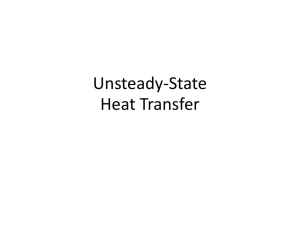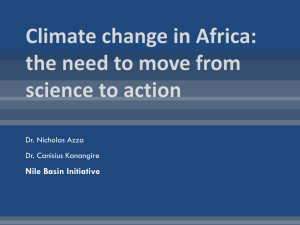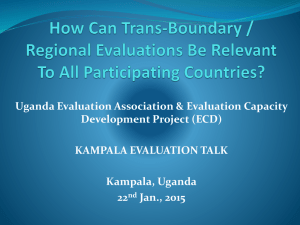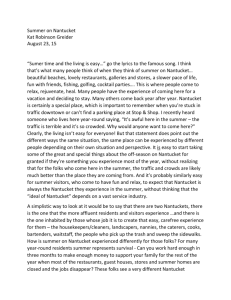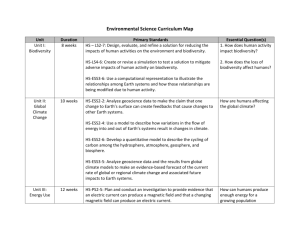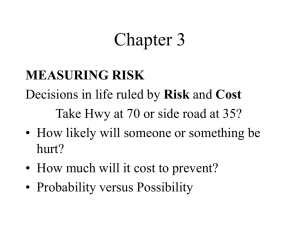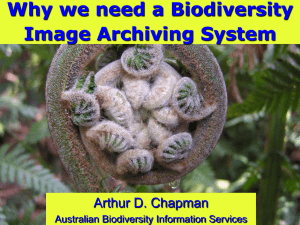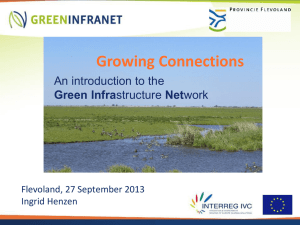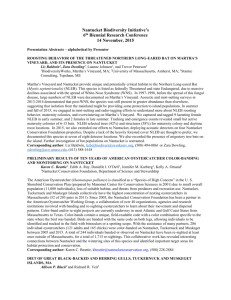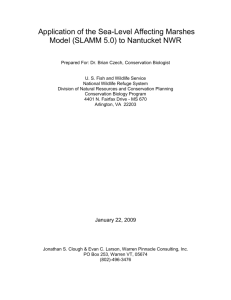Nantucket Biodiversity Initiative
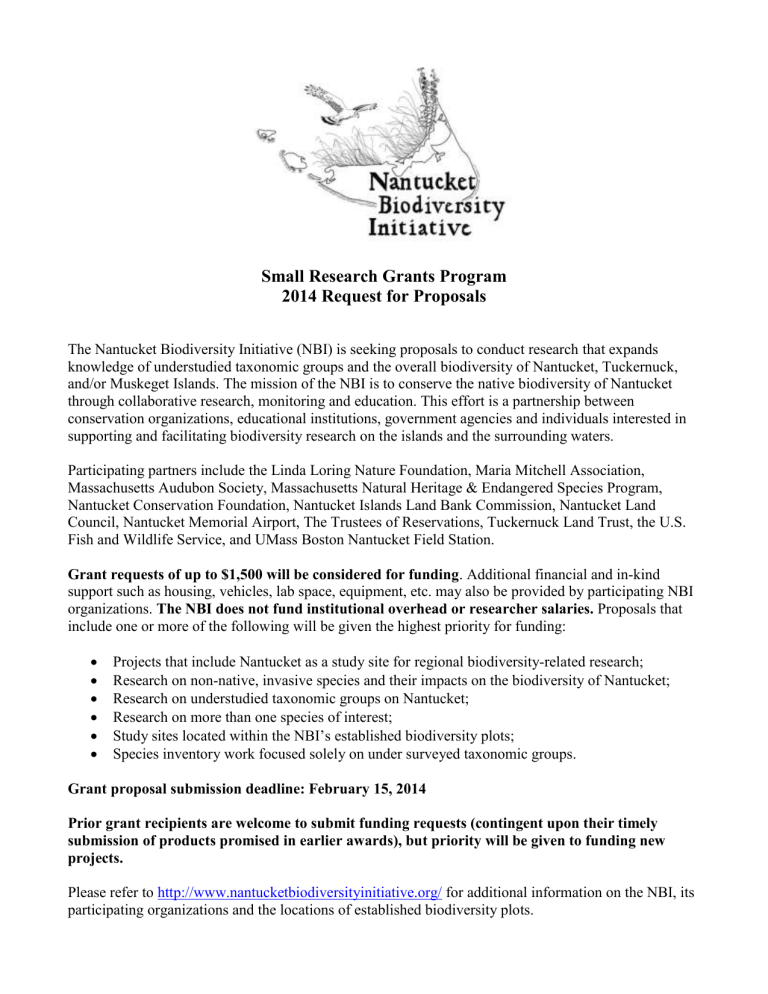
Small Research Grants Program
2014 Request for Proposals
The Nantucket Biodiversity Initiative (NBI) is seeking proposals to conduct research that expands knowledge of understudied taxonomic groups and the overall biodiversity of Nantucket, Tuckernuck, and/or Muskeget Islands. The mission of the NBI is to conserve the native biodiversity of Nantucket through collaborative research, monitoring and education. This effort is a partnership between conservation organizations, educational institutions, government agencies and individuals interested in supporting and facilitating biodiversity research on the islands and the surrounding waters.
Participating partners include the Linda Loring Nature Foundation, Maria Mitchell Association,
Massachusetts Audubon Society, Massachusetts Natural Heritage & Endangered Species Program,
Nantucket Conservation Foundation, Nantucket Islands Land Bank Commission, Nantucket Land
Council, Nantucket Memorial Airport, The Trustees of Reservations, Tuckernuck Land Trust, the U.S.
Fish and Wildlife Service, and UMass Boston Nantucket Field Station.
Grant requests of up to $1,500 will be considered for funding . Additional financial and in-kind support such as housing, vehicles, lab space, equipment, etc. may also be provided by participating NBI organizations. The NBI does not fund institutional overhead or researcher salaries.
Proposals that include one or more of the following will be given the highest priority for funding:
Projects that include Nantucket as a study site for regional biodiversity-related research;
Research on non-native, invasive species and their impacts on the biodiversity of Nantucket;
Research on understudied taxonomic groups on Nantucket;
Research on more than one species of interest;
Study sites located within the NBI’s established biodiversity plots;
Species inventory work focused solely on under surveyed taxonomic groups.
Grant proposal submission deadline: February 15, 2014
Prior grant recipients are welcome to submit funding requests (contingent upon their timely submission of products promised in earlier awards), but priority will be given to funding new projects.
Please refer to http://www.nantucketbiodiversityinitiative.org/ for additional information on the NBI, its participating organizations and the locations of established biodiversity plots.
Proposal Format:
1.
Project Description (three pages or less, single spaced, 12 pt font): the Project Description should provide a review of results of any previous biodiversity research on Nantucket (and Cape
Cod and other nearby islands if appropriate) on the subject of proposed study, the goals and objectives of the proposed project, methods, a project timeline, and expected products (e.g., publications, geo-referenced specimen/occurrence data, web pages, keys, checklists, etc.). If the
Project Description exceeds the required length, it will be returned to the Principal Investigator for revision and not reviewed again until the 2014 funding cycle.
2.
Budget: the budget should include a brief justification for each budgeted item and a short paragraph indicating any assured or anticipated matching funds (actual dollars or "in-kind" support) that could be leveraged by a successful NBI grant award, including “in-kind” services provided by all professionals, students and technical assistants. NBI policy does not permit use of grant funds for the payment of indirect expenses and/or overhead. However, these expenses can be included as “in-kind” services, as described above.
3.
Literature Cited/References.
4.
Supporting Materials (CV, publication list) and Appendices (maps, tables, graphs, etc.) if relevant.
Reporting Requirements and Grant Payment Schedule:
An electronic copy of the final report and, if applicable, inventory data and Voucher Specimens of all species collected (properly prepared with a full set of geo-referenced data) is due by February 15, 2015.
The final report format must conform to the “Guidelines for NBI-funded Research Reports”
(attached to this RFP).
The NBI strongly encourages successful grant applicants to prepare a poster or deliver an oral presentation of their research results (even if only preliminary) at the next scheduled NBI
Conference in 2015 on Nantucket (exact dates and venue to be announced).
Successful grants will be issued in two payments. The first payment will be issued at the initiation of the project (the amount and timing will be determined by the NBI Grant committee). The second payment will be issued upon receipt of an acceptable final report, inventory data, and voucher specimens (if applicable).
Please direct questions and send your proposal electronically by 5:00 PM on February 15, 2014 to:
Karen Beattie ( kbeattie@nantucketconservation.org) , NBI Grants Committee Co-Chair.
Guidelines for NBI-funded Research Reports
The mission of the Nantucket Biodiversity Initiative (NBI) research program is to increase knowledge of understudied taxonomic groups and of the overall biodiversity of Nantucket, Tuckernuck, Muskeget and surrounding waters. The NBI facilitates collaboration, research, and data storage and sharing between on and off-island researchers, conservation interests and the general public. An important part of any research project, including smaller-scale or short-term projects, is written documentation of the work and reporting of the results, without which the knowledge gained has little value. For this reason, and in an effort to standardize reports across research projects, we have developed some basic guidelines to follow when preparing research reports for the NBI. We hope this structure is useful and will help you prepare a better, more informative report. The NBI committee is working to update our website and will be making all final reports available online in order to broaden access to the biodiversity research funded by the NBI.
Please submit all reports as Microsoft Word documents in 12 point Times New Roman font with 1.5 line spacing and 1” margins. All tables and figures should be included at the end of the document rather than embedded within the text. Reports should be as succinct as possible while providing a complete description of all aspects of the project as described in the original funded proposal. Jargon should be avoided whenever possible. Annual reports for multiyear projects should also follow these guidelines.
Reports should include the following:
Abstract (500 word limit)
Introduction
Methods and study sites
Results
Discussion
Acknowledgments
Literature Cited
Tables and Figures
For all other formatting questions, please refer to the formatting guidelines of the Ecological Society of
America www.esapubs.org/esapubs/AuthorInstructions.htm
. Voucher specimens should be deposited in the Maria Mitchell Association Natural Science Museum and a list of species found, habitat type, location, etc. should be provided using the excel spreadsheet available for download at www.nantucketbiodiversityinitiative.org.
We understand that this format may not be appropriate for all projects funded by the NBI, especially those that are primarily species inventory-based. If you feel that these guidelines will not fit the type of research you are proposing, please contact the NBI grants committee with suggested format changes.
